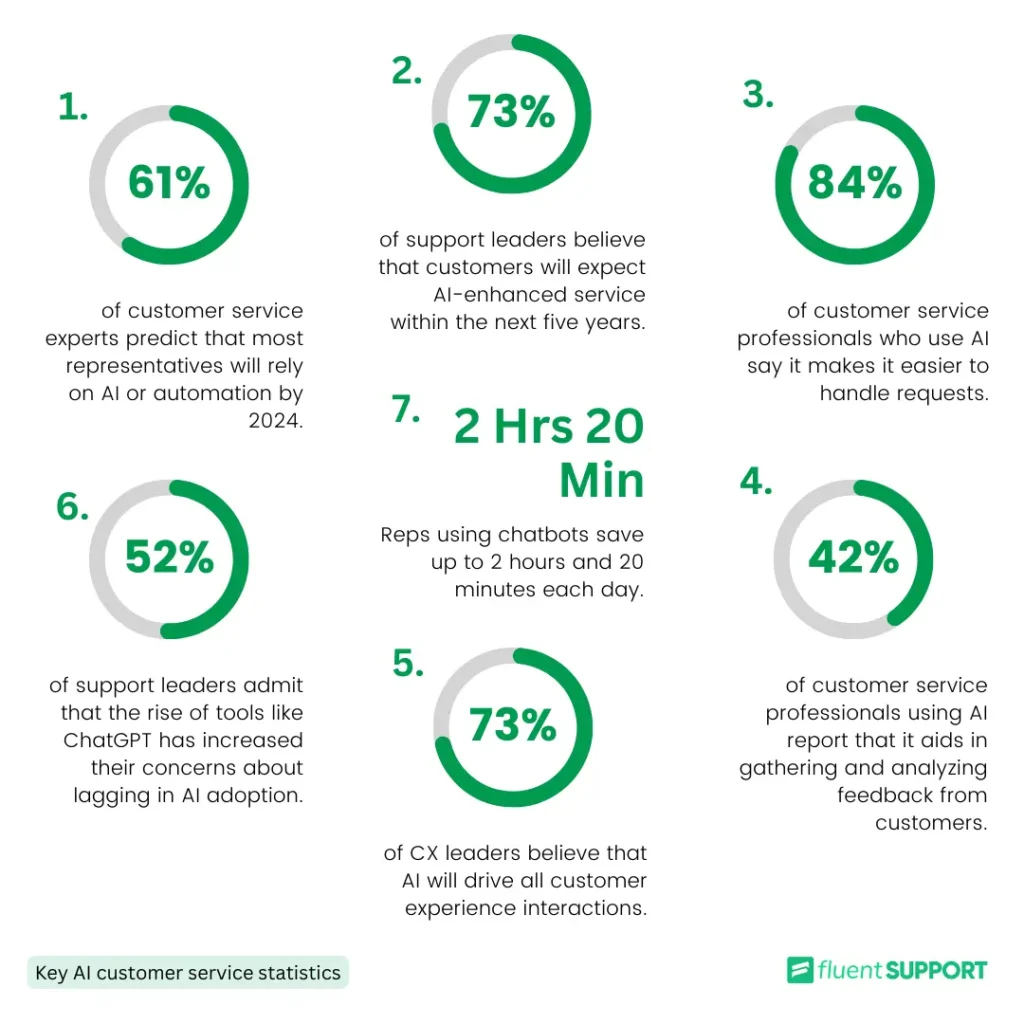
50+ AI Customer Service Statistics: Insights and Trends for 2025
By Uttam Kumar Dash
October 14, 2024
Last Modified: August 25, 2025
Customer service is changing fast, and AI is leading the charge. And, it will be quite impossible for the customer service industry to function in 2025 and beyond without the help of AI.
Therefore, understanding some trending and core AI customer service statistics is key for businesses wanting to keep up. By recognizing the importance of these statistics, businesses can adapt their strategies and improve customer relationships.
AI in customer service statistics
Let’s explore how AI can and will transform your customer service approach!
1. Investment and expectations
Many businesses are putting money into AI to make customer service better. Let’s look at how this spending can help:
- Two-thirds of business leaders say that spending on customer service AI leads to big improvements. (Zendesk)
- Nearly 80% of customer service leaders plan to invest more in AI over the next two years. (Deloitte Digital)
- 72% of business leaders say that adding AI to customer experience is a top goal this year. (Zendesk)
- 58% of leaders believe that using AI for support would build customer trust. (Intercom)
- 60% of support leaders expect to lower support costs in the next five years by using AI. (Intercom)
- 70% of organizations plan to invest in AI and automation for customer service within the next year. (KlausApp)
- 55% of support leaders say that ChatGPT makes them more likely to invest in AI this year. (Intercom)
2. Consumer perceptions
Customers have their thoughts about AI in customer service. Understanding what they think can help companies do better:
- 75% of consumers think chatbots give the right answers. (Zendesk)
- 52% of consumers are interested in AI that helps them use products or websites. (Survey Monkey)
- About 80% of consumers find AI bots helpful for easy issues. (Zendesk)
- More than 70% of consumers expect AI to make service better. (Zendesk)
- 40% of consumers believe that AI agents will change how they buy from brands. (Zendesk)
- 75% of consumers think AI should offer the same help as human agents. (Zendesk)
- 73% of customers believe AI will improve service quality. (Zendesk)
- 74% of consumers prefer a callback instead of being on hold for a customer service agent. (SupportYourApp)
- 71% of Americans would rather talk to a human than a chatbot. (PwC)
3. AI effectiveness
We need to know how well AI tools are working. This can show businesses which tools to use for great support:
- 42% of customer service pros using AI say chatbots that respond to requests are very effective. (Hubspot, State of AI)
- 33% of customer service pros using AI say tools that check social media for service problems are very effective. (Hubspot, State of AI)
- 31% of customer service leaders used AI chatbots in 2023, and 71% plan to invest more in them. (HubSpot, State of Customer Service)
- 10% of leaders want to invest in AI chatbots and customer support in 2024. (HubSpot, State of Customer Service)
- 53% of customers think generative AI will help companies serve them better. (Salesforce Research)
- Service professionals save over 2 hours daily by using generative AI for quick responses. (HubSpot, State of AI)
- 84% of customer service reps using AI say it makes responding to tickets easier. (HubSpot, State of AI)
- 64% of customer service reps using AI say it helps them personalize their messages. (HubSpot, State of AI)
- 60% of support leaders say they are most excited about faster response times with AI. (Intercom)
- 42% of customer service pros using AI believe it will greatly improve customer experience. (HubSpot, State of AI)
4. Concerns and challenges
Some people worry about using AI in customer service. And, knowing these worries can help businesses use AI more wisely:
- 53% of support teams worry about how AI might harm customer service. (Intercom)
- 44% of customer service pros don’t use AI because customers prefer talking to humans. (HubSpot, State of AI)
- 64% of customer service specialists, whose teams got smaller in 2024, say AI lessens the need for reps. (HubSpot, State of AI)
- 30% of leaders with smaller budgets for customer service in 2024 say AI made operations cheaper. (HubSpot, State of AI)
- 42% of customer service pros believe AI will change the way customers interact with their companies. (HubSpot, State of Customer Service)
- Nearly half (49.5%) of customer service specialists think humans should work with AI to solve requests. (HubSpot, State of Customer Service)
5. Productivity gains
AI can help workers do their jobs faster and easier. Let’s see how using AI can boost productivity in customer service:
- Using AI to sort service issues and route customer contacts increases agent productivity by about 1.2 hours a day. (Freshworks)
- On average, using AI tools helps people work faster. It increases the number of issues solved per hour by 14%. Newer and less skilled workers see a big boost of 34%, but it doesn’t change much for those who are already experienced and skilled. (NBER)
- Almost two-thirds of customer service tasks and up to 70% of contacts can be automated with an AI-powered system. (McKinsey)
- 79% of businesses think automation is essential for a good customer experience. (Verint)
- 80% of customer support specialists believe AI/automation can help them spend less time on manual tasks. (HubSpot, State of AI)
- 78% of customer support specialists agree that AI/automation can help them work more efficiently. (HubSpot, State of AI)
- 66% of customer support specialists feel that AI/automation can help personalize customer experiences. (HubSpot, State of AI)
- 62% of customer support specialists think AI/automation can help them understand customers better. (HubSpot, State of AI)
- 71% of customer support specialists agree that AI/automation can improve the overall customer experience. (HubSpot, State of AI)
- 55% of customer support specialists believe most software will have AI or automation features by 2024. (HubSpot, State of AI)
- 66% of customer service pros using AI/automation think that these tools will soon handle most service tasks on their own. (HubSpot, State of AI)
- 84% of customer service pros using AI/automation agree that it will make responding to requests easier by 2024. (HubSpot, State of AI)
6. Customer service/support/experience expert insights
There are many other interesting facts about AI in customer service. These unique insights can show us different ways AI is being used:
- 61% of customer service workers think that most of their teammates will use AI and automation by 2024. (HubSpot, State of AI)
- 74% of service reps believe AI tools can quickly find and use information about customers. (Zendesk)
- 73% of leaders in customer support expect customers to want AI help in the next five years. (Intercom)
- 52% of support leaders are worried that they are falling behind in using AI solutions, especially because of tools like ChatGPT. (Intercom)
- 84% of customer service pros who use AI say it will make responding to customer questions easier by 2024. (HubSpot, State of AI)
- 22% of customer service workers believe AI tools help make the service process better. (HubSpot, State of AI)
- Reps using chatbots save up to 2 hours and 20 minutes each day when helping customers. (HubSpot, State of AI)
- 42% of customer service workers say AI helps them collect and understand feedback from customers about their experiences. (HubSpot, State of Customer Service)
- 29% of customer service leaders whose companies use AI tools report that these tools give a very good return on investment. In comparison, 47% say the return is somewhat good. (HubSpot, State of AI)
- 73% of customer experience leaders think that AI will drive all customer interactions. (Zendesk)
- 1 in 3 people who decide to use AI say it’s important to make it smart enough to predict what customers need and offer personal experiences. (Freshworks)
References

Why AI in customer service matters more than ever
AI in customer service isn’t just a trend; it’s becoming a necessity. Businesses around the world are leaning into AI because it makes everything smoother, faster, and more efficient.
From answering basic questions to handling more complex queries, AI-powered tools are reshaping how companies interact with their customers.
Customers today expect quick responses, accurate solutions, and personalized experiences. AI can deliver all of this by automating repetitive tasks, analyzing vast amounts of data, and ensuring 24/7 support availability.
In a place where customers’ patience is shrinking, AI tools help businesses meet their needs faster, improving satisfaction and loyalty.
Moreover, the rise of advanced AI models like ChatGPT has added a new level of interaction. These models don’t just answer questions—they understand context, tone, and nuances.
This ability to mimic human-like conversations allows companies to create more engaging and helpful interactions. For that reasons, AI is quickly becoming an integral part of the customer service experience.
The key stats you need to know for 2025
These figures highlight why investing in AI-driven customer service is more critical than ever.

Now let’s break down their importance.
| Key Statistic | Importance |
|---|---|
| 61% of customer service experts predict that most representatives will rely on AI or automation by 2024. | Companies need to get ready because more people will use AI to make service faster and smoother. |
| 73% of support leaders believe that customers will expect AI-enhanced service within the next five years. | People want quick help, and AI makes that possible. Companies that use AI will keep customers happy. |
| 84% of customer service professionals who use AI say it makes it easier to handle requests. | AI can speed up how companies answer questions, so workers can focus on more important tasks. |
| 52% of support leaders admit that the rise of tools like ChatGPT has increased their concerns about lagging in AI adoption. | New tools like ChatGPT show how important it is to start using AI soon, so companies don’t fall behind. |
| 42% of customer service professionals using AI report that it aids in gathering and analyzing feedback from customers. | AI helps companies understand what customers like or don’t like, so they can improve their service. |
| Reps using chatbots save up to 2 hours and 20 minutes each day. | Chatbots save time by handling simple questions, letting workers focus on bigger problems. |
| 73% of CX leaders believe that AI will drive all customer experience interactions. | AI will be a big part of how companies help customers in the future, making everything faster and more personal. |
Businesses that prepare now will be better equipped to meet growing customer demands and optimize operations. Also, they will stay ahead in an increasingly competitive market.
How to leverage these AI-based customer service statistics
Here are some insights on what we can leverage in general from the stats:
- Identify key areas for automation: Statistics show that AI is excellent at handling repetitive tasks. Look at where your team spends the most time, such as answering basic FAQs or processing simple requests. Integrate chatbots or automation tools to handle these tasks, freeing up your human agents for more complex issues.
- Enhance personalization: One of the most effective uses of AI is data analysis. Use AI to analyze customer behavior, preferences, and past interactions to offer personalized solutions or recommendations. This improves customer satisfaction and can lead to higher sales conversions.
- Improve response times: Customers want quick answers, and AI can deliver. By automating initial responses and routing queries to the right departments, you can significantly reduce response times, which statistics show is a key factor in customer satisfaction.
- Analyze feedback efficiently: AI can process and analyze feedback more quickly than a human team. Use this capability to understand customer sentiments, identify pain points, and spot trends in feedback. This helps you make data-driven decisions to improve your service.
- Support a hybrid customer service model: While AI can handle a lot, there will always be issues that need a personal touch. Combine AI with your human agents for a seamless customer experience. Let AI handle basic queries and escalate the more complex ones to skilled support agents.
- Prepare for future trends: Statistics show a rising trend in the expectation of AI-assisted service. Stay ahead by investing in emerging technologies like predictive AI, which can foresee customer needs before they ask, or NLP (Natural Language Processing) to improve the quality of AI responses.
Find, store and access customer feedbacks
all in one system.
The future of customer service with AI: what to expect
As AI continues to evolve, its role in customer service is set to expand. Here’s what the future may hold:
- More personalized experiences: AI will help businesses learn more about what customers like. It can study past orders and behavior, leading to better recommendations. For example, it might suggest a product before you even know you need it. This makes the shopping experience more personal and fun.
- Quicker, seamless support across channels: AI will make it easy for customers to get help no matter where they start. You can start a chat on social media, switch to email, and finish on a website without repeating your issue. Future AI will keep conversations smooth across all platforms.
- Advanced problem-solving abilities: Today, AI handles simple questions. But soon, it will be able to fix more complex problems. It can learn how to handle technical issues and give detailed answers about products, making support smarter.
- Proactive customer support: Instead of waiting for a problem, future AI can predict issues. For example, it might remind you if your payment method is about to expire or suggest fixes for common product troubles. This can help solve problems before they happen.
- Integration with emerging technologies: AI will work with new tech like augmented reality (AR) and virtual reality (VR). Imagine using an AR headset to get help with a product or exploring a 3D product model with VR while AI guides you. This will make support more engaging and effective.
Wrap up
AI in customer service is not about replacing humans; it’s about enhancing how businesses interact with their customers. Companies that understand this and integrate AI strategically will set themselves apart by providing faster, more personalized, and efficient service.
By starting small, focusing on personalization, ensuring smooth human-AI collaboration, and keeping an eye on future trends, businesses can unlock the full potential of AI in customer service.
The future of customer experience lies in leveraging these insights to create seamless, engaging, and effective interactions, building stronger relationships with customers.
Start off with a powerful ticketing system that delivers smooth collaboration right out of the box.
Hi, I’m Sajid Sadman, a digital marketer specializing in customer service and user experience. With a passion for content writing, I create engaging and impactful content to enhance user satisfaction.












Leave a Reply